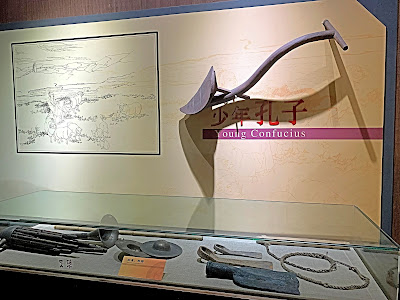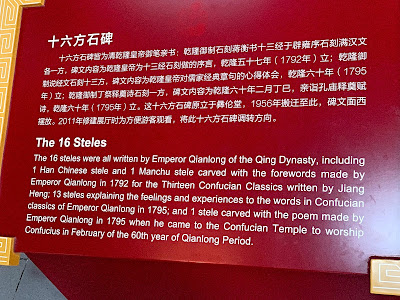Beijing Confucius Temple
2nd largest Confucian Temple in all of China. Originally built in 1302.
Guozijian
The Imperial College during the Yuan, Ming and Qing Dynasties. Originally built in 1306. Today it is a museum showcasing the exam system used to select talent for government officials during the feudal China era.
Stone Stele marking the conferring of a title on Confucius
Stone steles engraved with name lists of Jin Shi of the Qing Dynasty
name lists
Stone stele made by the order of the Emperor to mark the opening of a New Imperial College
Stone stele made by order of the Emperor to mark the successful suppression of the riot in Qinghai and placed in the Imperial College
"Confucian 'filial peity' requires that children should guarantee lives of their parents on one hand and provide spiritual comforts to their parents on the other. Children should remind their parents if they have done something wrong. Those who can do all of these are said to be 'pious'."
"Confucius thinks that 'benevolence' comes from 'filial piety', and that 'piety' is based on the equality of parents and children concerning human dignity. This means the existence of 'a merciful father, a dutiful son, a friendly elder brother and a respectful younger brother, a righteous husband and a loyal wife.' He opposes both the one-way obedience of children to their parents and the one-way commanding of parents to their children."
"The biology in The Book of Songs, the astronomy and geography in The Books of Documents, and the scientific inventions in The Book of Change are all the contents of Confucius' teaching. In The Analects of Confucius which records his words and actions, there are 82 sentences about biology and materials related to mathematics occupy 1.5% of the whole book."
"The imperial examination system enabled many poor common people to take part in the administration. This constant change of the members of government embodied the democracy of Confucius' political theory to some extent."
"Under the influence of Confucian political theory, the system of recruiting government officials evolved from a hereditary system to a Recommending System and then later to the Nine Rank System. In the Sui and Tang Dynasties ( 589 - 622 AD), China developed an imperial examination system which were dependent on examination merits disregarding the born aristocracy of the candidates."
"Confucius believes that in governing a state virtue and law must be used at the same time and he points out that only virtuous and capable people should occupy positions in government."
"One of the 4 Classic works on Chinese traditional medicine and is the earliest classic work among the existing books on medicine."
"Confucius thinks that before a society reaches 'great harmony', it will experience the phase of 'moderate prosperity'."
"Confucius made known his ideas to the kings of all states, trying to persuade them to give up arms and harsh government and build a world of 'great harmony'. His political ideas were refused by some of the kings, but he was far from discouraged and still tried to bring them into practice."
"Confucius believes that the common people have the right to evaluate the performance of the government. Later, Mencius developed his theory and claimed that if the king behaves immorally, his subjects are entitled to overthrow and replace him. This reveals the democratic spirit of Confucianism."
"In the 25th year of the reign of King Luzhaogong (517 BC) there were riots and civil war in the State of Lu. Fled to the State of Qi to avoid the catastrophe of war, Confucius and his disciplines met a woman weeping before a tomb. She said with a crying tone that 3 generations of her family were killed by tigers but she still was unwilling to move out of the mountain area to be bullied by officials. Confucius therefore sighed that 'harsh government is even tougher than tigers'."
Copper Vessel, made in Western Zhou Dynasty
Bronze Vessel, a grain container
Bronze vessel for cooking
"The words about music on these bamboo slips are possibility the notes taken by Confucius' disciples in a music class."
Hemispherical Bowl for offering fruits
Stone stele with inscription of Emperor KangXi of the Qing Dynasty
"Da Xue is one of the 4 books originated in the Book of Rites. It was said to have been written by Zengzi and held up as works on politics and philosophy of Confucian school."
The 16 Steles
"The 16 Steles were all written by Emperor Qianlong of the Qing Dynasty, including 1 Han Chinese stele and 1 Manchu stele carved with the forewords made by Emperor Qianlong in 1792 for the 13 Confucian Classics written by Jiang Hang; 13 steles explaining the feelings and experiences to the words in Confucian classics of Emperor Qianlong in 1795; and 1 stele carved with the poem made by Emperor Qianlong in 1795 when he came to the Confucian Temple to worship Confucius in February of the 60th year of Qianlong Period."
Qianlong Stone Steles engraved with 13 Confucian Classics during the Qing Dynasty
"The Qianlong Stone Steles refer to the steles engraved with 13 Confucian Classics during the reign of Emperor Qianlong. The classics have more than 628,000 Chinese characters, all written in regular script by Jiang Heng, a Gong Sheng (scholar recommended by local government for further studies at the Imperial College) from Jiangsu during the reign of Qing Emperor Yongzheng. It took him 12 years to complete the writing. In 1791, engraving began and continued for 3 years before all the classics were engraved on 189 stone steles. These steles used to be placed in the 6 Halls on the Eastern and the Western sides of Guo Zi Jian (The Imperial College) and were moved here in 1956. They offer the most complete official version of stone-carved classics.
The 13 books are Book of Changes, Collection of Ancient Texts, Book of Songs, Rites of the Zhou, Etiquette and Ceremonials, The Rites, Spring and Autumn Annals with Commentaries by Zuo Qiuming, Spring and Autumn Annals with Commentaries by Gongyang Gao, Spring and Autumn Annals with Commentaries by Guliang Chi, The Analects of Confucius, Book of Filial Piety, Near Correctness, The Book of Mencius."
"As a system, the imperial examination has fair competition as its essence. The poor, the rich, the noble and the humble have the chance to get promotion through examniation. It reflects universal respect to dignity and ability. Such spirit is a cultural wealth for China and the world as a whole. The imperial examination is gone with the past dynasties."
Ancient way of referencing
"Many European preachers coming to China in the 17th and 18th centuries were stunned and envious about the imperial examination system in China as if they had found the cultural 'New World'. In succession, they introduced and recommended Chinese imperial examination system to their countries. Chinese imperial examination system conducted competition in examination, selection of the outstanding and the regime opened to the civilians, promoted the candidate selection in public, and only selected the talent. In reference to the imperial examination system, the western country has established modern civilian examination system."
"Vietnam is the country that carried out the imperial examination the latest among the 3 East Asian countries and abolished the examination the latest in the world."
"Korea has been the country where the imperial examination system has been carried out the longest and the most completed outside China from 958 to1894; 936 years."
"The imperial examination system began to be widely spread in Southeast Asia since Tang Dynasty. Japan and Korea in succession carried out system of imperial examination in selecting officials. The impact the imperial examination system imposed on western countries started from the western preachers when French preacher J. Bouret introduced the imperial examination system to Europe, which influenced the establishment of western civilian system."
Results from the imperial examination
Discipline Hall
College library
The streets outside of the temple and museum
Zhuan Er Hutong
Chill in Costa with a cool pomegranate tea
KFC
Wudaoying Hutong


































































































































































No comments:
Post a Comment